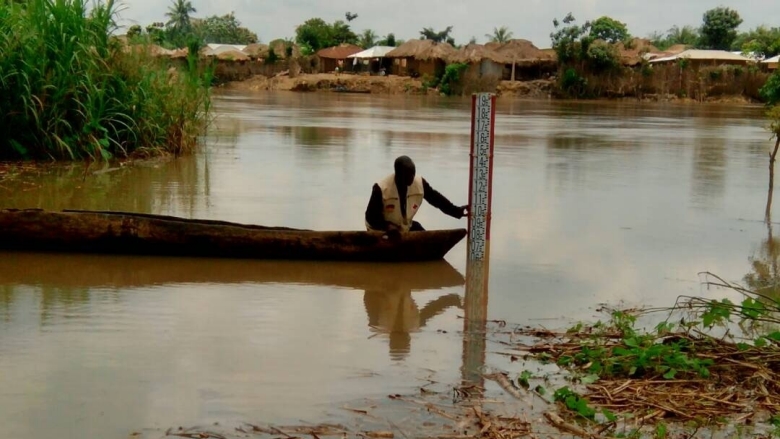Small River Basin Authorities Face Financial Challenges
In 2014, the governments of Benin and Togo established the Mono Basin Authority (MBA) to coordinate the management and development of the Mono River. Working cooperatively with a fully functioning Authority, the two countries hope to maximize development benefits while protecting the future value of the resource. In its first year the MBA solicited the central governments of the two countries and civil society to assess needs and actions that can be taken. The MBA worked to draft a Master Plan for Water Development and Management, and established basin and local water committees. The MBA also set out to strengthen information systems to establish agreed baselines for water quality, supply and health of the river.
In the past, other basin authorities in the region have seen funding dry up, effectively freezing operations and demoralizing the organization. "We want to mitigate the risk of irregular funding, because if water management isn't sustained, and therefore water quality is degraded, the first people to feel the consequences will be the local populations and the most vulnerable," says Toure. This concern is particularly important to small basin authorities that must dedicate a higher proportion of overall operating costs to core staff functions compared to larger basin authorities.
Toure’s office asked CIWA to do a study to help find innovative financing solutions for the MBA. The goal was to identify options to provide the MBA with lasting and consistent sources of financing, independent from country contributions. A team from CIWA, ECOWAS, and the MBA’s ad hoc Technical Committee of Experts recently concluded that study, called Sustainable Financing Mechanism Study for Mono Basin Authority. It looks at the Authority’s needs and functions, identifies ways to cut costs, evaluates potential sources of financing, and recommends short-, medium-, and long-term ways to finance the authority. The study focused on potential financing mechanisms, including member state contributions, a dedicated regional tax, user fee-based financing, polluter fee-based financing, sale of data and services, project management fees for infrastructure projects, management and administration fees, dividends from an investment fund, donor contributions, and public-private partnerships.
The study found that a small user-fee-based levy to hydropower and the mining sector would be the best solution. This would generate enough resources to finance a compact version of the Authority focused on key functions, and, importantly, “it would allow the organization to function independently from contributions from the states," Toure noted.
With the organization not yet fully operational, the Authority is at a critical stage. Decision-makers still have the flexibility to determine the organizational structure and sources of financing. Toure feels confident that at the next meeting, the Council of Ministers will adopt the recommendations to ensure steady Authority financing. Lessons learned from the MBA and this financing study can be readily shared with other countries considering cooperation over smaller shared water resources.
In 2014, the governments of Benin and Togo established the Mono Basin Authority (MBA) to coordinate the management and development of the Mono River. Working cooperatively with a fully functioning Authority, the two countries hope to maximize development benefits while protecting the future value of the resource. In its first year the MBA solicited the central governments of the two countries and civil society to assess needs and actions that can be taken. The MBA worked to draft a Master Plan for Water Development and Management, and established basin and local water committees. The MBA also set out to strengthen information systems to establish agreed baselines for water quality, supply and health of the river.
In the past, other basin authorities in the region have seen funding dry up, effectively freezing operations and demoralizing the organization. "We want to mitigate the risk of irregular funding, because if water management isn't sustained, and therefore water quality is degraded, the first people to feel the consequences will be the local populations and the most vulnerable," says Toure. This concern is particularly important to small basin authorities that must dedicate a higher proportion of overall operating costs to core staff functions compared to larger basin authorities.
Toure’s office asked CIWA to do a study to help find innovative financing solutions for the MBA. The goal was to identify options to provide the MBA with lasting and consistent sources of financing, independent from country contributions. A team from CIWA, ECOWAS, and the MBA’s ad hoc Technical Committee of Experts recently concluded that study, called Sustainable Financing Mechanism Study for Mono Basin Authority. It looks at the Authority’s needs and functions, identifies ways to cut costs, evaluates potential sources of financing, and recommends short-, medium-, and long-term ways to finance the authority. The study focused on potential financing mechanisms, including member state contributions, a dedicated regional tax, user fee-based financing, polluter fee-based financing, sale of data and services, project management fees for infrastructure projects, management and administration fees, dividends from an investment fund, donor contributions, and public-private partnerships.
The study found that a small user-fee-based levy to hydropower and the mining sector would be the best solution. This would generate enough resources to finance a compact version of the Authority focused on key functions, and, importantly, “it would allow the organization to function independently from contributions from the states," Toure noted.
With the organization not yet fully operational, the Authority is at a critical stage. Decision-makers still have the flexibility to determine the organizational structure and sources of financing. Toure feels confident that at the next meeting, the Council of Ministers will adopt the recommendations to ensure steady Authority financing. Lessons learned from the MBA and this financing study can be readily shared with other countries considering cooperation over smaller shared water resources.




